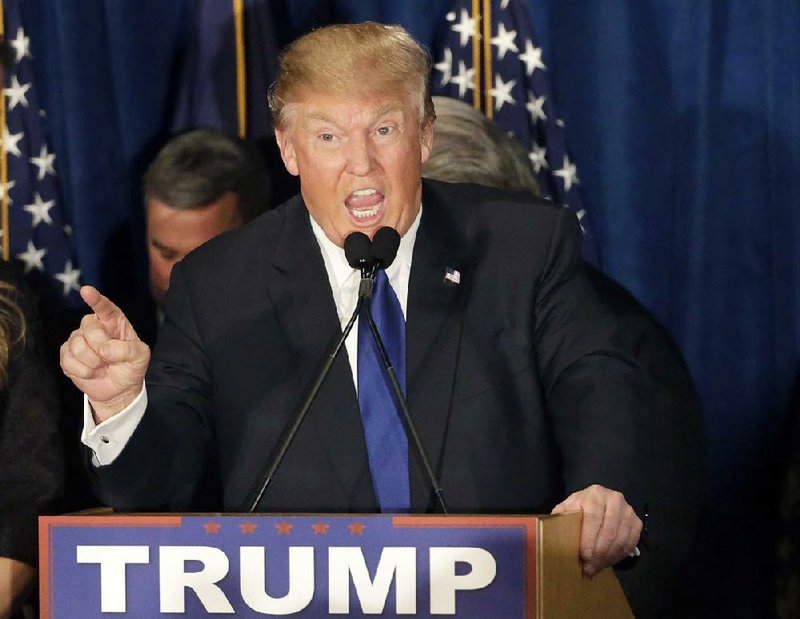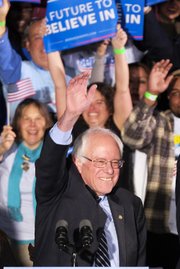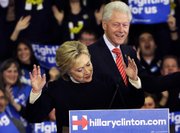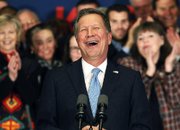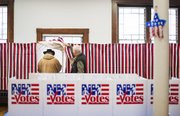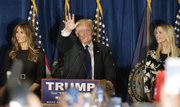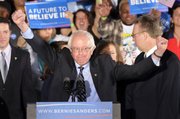MANCHESTER, N.H. -- Republican Donald Trump and Democratic hopeful Bernie Sanders surged to the top in Tuesday night's primaries in New Hampshire, where each led the polls for months.
RELATED ARTICLE
http://www.arkansas…">Sanders campaign reporting sign thefts
FULL ELECTION COVERAGE
Both sought to deliver on expectations after second-place finishes in last week's lead-off Iowa caucuses, where Ted Cruz topped the Republican field and Hillary Clinton narrowly edged Sanders in the Democratic race.
With 88 percent of precincts reporting for Republicans, Trump had received 35 percent of the vote. Sanders had 60 percent of the vote with 88 percent of precincts reporting Democratic results.
"When we stand together, we win. Thank you, New Hampshire!" Sanders said on Twitter.
In his victory speech later in the evening, Sanders said the results "sent the message that will echo from Wall Street to Washington, from Maine to California" that wealthy donors and super political action committees don't control the country.
Clinton congratulated Sanders on his victory in her concession speech in Hooksett and vowed to battle on, saying she knows how to get results that voters are demanding.
"Now we take this campaign to the entire country, and we're going to fight for every vote in every state," Clinton said. "We're going to fight for real solutions and make a difference in people's lives."
Clinton echoed Sanders' calls for taking on Wall Street banks and tackling income inequality but cast herself as more prepared to make good on her policy pledges. "People have every right to be angry. But they're also hungry, they're hungry for solutions," she said after congratulating Sanders on his victory.
For the Republican Party, Trump assumed front-runner status in the Republican nominating contest after finishing second in Iowa.
"We are going to do something so good and so fast and so strong and the world is going to respect us again, believe me," Trump said at a victory rally.
Ohio Gov. John Kasich, with 16 percent of the vote, emerged as the runner-up in a fight among Republicans trying to establish themselves as an alternative to Trump, a political outsider, and to Cruz, a tea party favorite.
In the midst of a heated primary campaign, Kasich has prided himself on not attacking his rivals. Effectively skipping Iowa, Kasich spent 62 days in New Hampshire, holding 106 town hall-style events.
He told supporters Tuesday night that a second-place finish could be an indication that "we're turning the page on a dark part of American politics."
"There's magic in the air with this campaign," Kasich said in Concord, adding that it's an opportunity to change America and "leave no one behind."
Cruz, U.S. Sen. Marco Rubio of Florida and former Florida Gov. Jeb Bush were locked in a tight race for third.
New Jersey Gov. Chris Christie, who has staked his candidacy on New Hampshire, lagged behind the pack in early vote counts. Late Tuesday, he told supporters he was heading home to New Jersey to "take a deep breath" and wait for the final New Hampshire results before making a decision about the future of his campaign.
But Bush's campaign maintained confidence, with spokesman Tim Miller saying Kasich "ran a one-state campaign" and doesn't have "a viable path" to the nomination. He added that the Bush campaign feels "very confident about our position" in South Carolina.
Rubio had appeared to be breaking away after a strong showing in Iowa, but he stumbled in Saturday's debate under intense pressure from Christie, who has cast the senator as too inexperienced.
Rubio conceded that the debate may have hurt him in Tuesday's contest and pledged to supporters that his poor performance "will never happen again."
From the remaining slate of GOP candidates, former technology executive Carly Fiorina vowed that she was "not going to sit down and be quiet" as votes continued to be tallied. Retired neurosurgeon Ben Carson trailed his rivals but also held fewer events in the state.
Sanders pulled from a broad coalition of New Hampshire voters, gathering a majority of votes from men, independents and voters under 45, as well as a slim majority of women. Clinton won the majority of those over 65 and those with incomes above $200,000 per year, according to early exit polls conducted by Edison Research.
Clinton's campaign argues she will perform better as the race heads to more racially diverse states, including Nevada and South Carolina. Both New Hampshire and Iowa are overwhelmingly white states that are less diverse than the nation as a whole.
In a memo distributed to reporters as the polls closed, Clinton's campaign manager, Robby Mook, said the campaigns were "splitting the first two contests," before arguing that Clinton remained the favorite for the nomination given her strength in the states to which the contest will move next.
"A Democrat who is unable to inspire strong levels of support in minority communities will have no credible path to winning the presidency in the general election," he said, adding, "The nomination will very likely be won in March, not February."
While Clinton's campaign dismissed Sanders' lead in New Hampshire as the "home-field advantage" of a New England candidate, the distinctions in what motivated voters were sharp.
Sanders, a U.S. senator from Vermont, was backed by 9 in 10 voters for whom honesty was important and 8 in 10 who wanted a candidate who "cares about people like me." Clinton, a former secretary of state, meanwhile, won support from nearly 90 percent of those who considered the "right" experience important in their decision and about 80 percent of those regarding electability as the most important factor.
Clinton, who won New Hampshire's primary in 2008, planned to huddle with her advisers today to discuss possible changes in political strategy and additions of staff members, according to Democrats close to Clinton. She also plans to discuss whether to mount new lines of attack against Sanders on Thursday night at their next debate.
While Trump has led in New Hampshire polls since July, and Sanders has been ahead for the past month, the wave of support for both men stunned leaders of both parties who believed voters would embrace more experienced candidates. Yet the two men won significant support from voters who felt betrayed by their respective parties and were dissatisfied or angry with the federal government.
Both Sanders, a self-described democratic socialist, and Trump, a billionaire businessman who has never held political office, have tapped into the public's frustration with the current political system.
In a sign of Trump's effect on the race, two-thirds of GOP voters said they supported a temporary ban on noncitizen Muslims entering the U.S., a position the billionaire businessman outlined last year as fears rose over terrorism emanating from the Middle East.
After finishing behind Cruz in Iowa last week, Trump embraced some of the more traditional trappings of presidential campaigns, including smaller town-hall events with voters. In addition to large-scale rallies, he campaigned in small diners and police stations.
But Trump didn't shift his tone. On the eve of the primary, Trump repeated a slang term to describe Cruz that some find vulgar, after someone at one of his rallies shouted the word. His remark was widely circulated on social media and grabbed cable news headlines.
Cruz brushed off Trump's comments, saying the reason the businessman engages in insults "is because he can't discuss the substance."
The large Republican field was winnowed after Iowa, but there remains a crowded grouping of more traditional candidates, including Rubio and the governors.
Kasich, Bush and Christie all poured enormous resources into New Hampshire in hope of jump-starting their White House bids in a state that has been friendly to moderate Republicans. All three could face pressure from party leaders and financial donors to end their campaigns without a strong showing.
New Hampshire has proved a stabilizing force in the last two Republican primaries, catapulting John McCain and Mitt Romney toward the nomination.
The next contests see the parties head in different directions on Feb. 20, with Democrats caucusing in Nevada and Republicans voting in South Carolina's primary. Then, the parties will swap states, with the GOP holding a Feb. 23 caucus in Nevada and Democrats taking to South Carolina for a Feb. 27 primary.
Those contests are followed up by "Super Tuesday," when 13 states -- including Arkansas -- host simultaneous primaries on March 1.
Information for this article was contributed by Julie Pace, Kathleen Ronayne, Lisa Lerer, Ken Thomas, Holly Ramer, Steve Peoples, Julie Bykowicz, Emily Swanson and staff members of The Associated Press; by Patrick Healy, Jonathan Martin and Jess Bidgood of The New York Times; and by Mark Niquette, Jennifer Epstein, Ben Brody, Kevin Cirilli and Margaret Newkirk of Bloomberg News.
A Section on 02/10/2016

